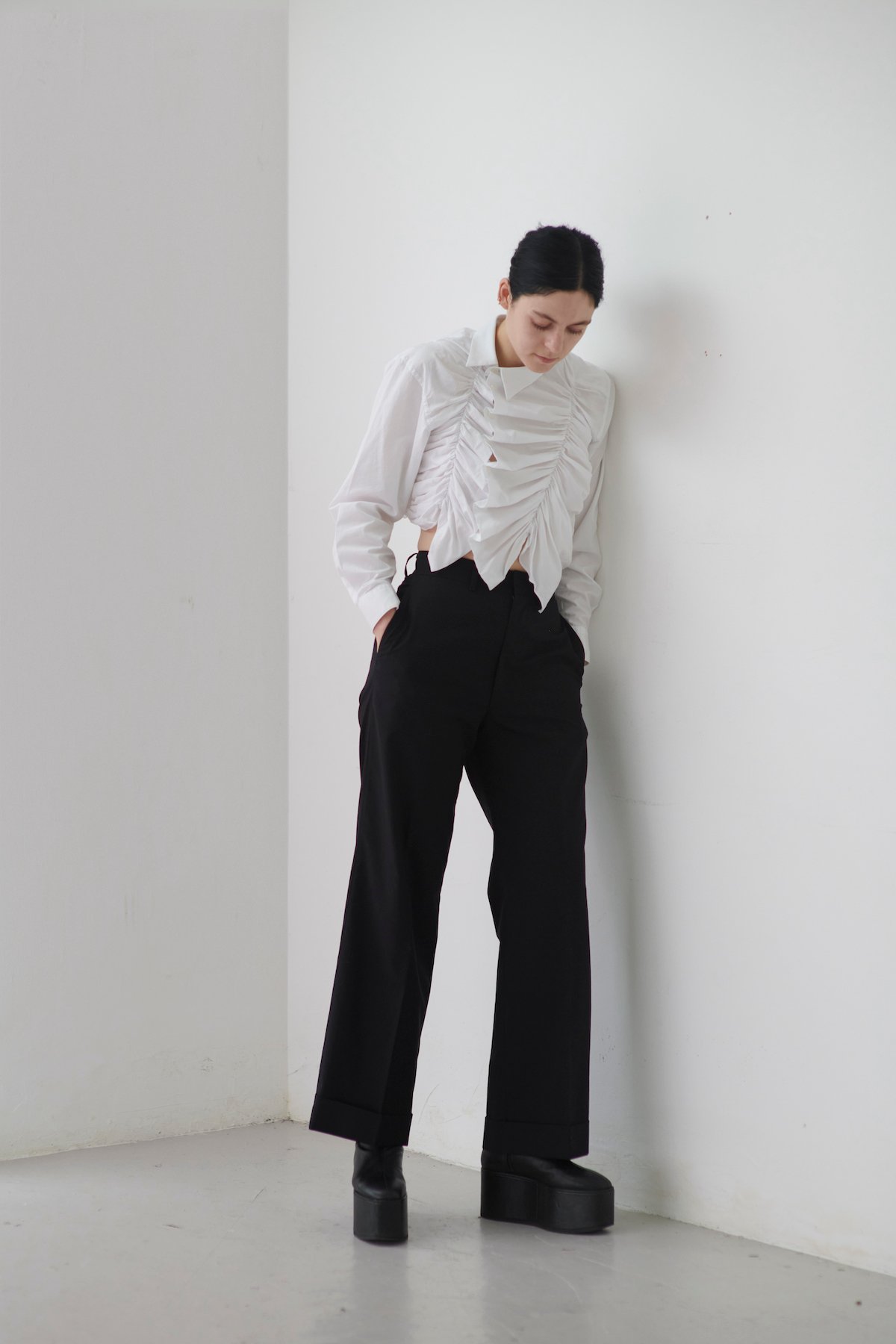
In the two years since she set up her eponymous East London gallery, Rose Easton has quickly built a reputation for staging adventurous shows that fuse the worlds of art, fashion, and eroticism. Before moving into the art world, she was creative director at the British brand Phoebe English. While she is now focused on curating and running the gallery—as well as leading Worms magazine’s book club and hosting the Vinyl Glossolalia podcast—her devotion to details, craftsmanship, and the psychological potential of materials is certainly informed by fashion.
The gallery is located near Bethnal Green station, in an industrial building close to the influential gallerist Maureen Paley’s original space, as well as Antonia Marsh’s Soft Opening. Easton regularly reimagines the space for exhibitions, with carpets installed, fixtures rebuilt, and walls cut and moved to house ambitious installations.
“When I started working in fashion, I would religiously go to exhibitions at Sadie Coles,” Easton told Artnet News, on the occasion of the current show “José” (until 4 November), with Mexican artist Arlette, who has previously created stage outfits for Kendrick Lamar. “At that point the gallery was doing a lot of immersive installations: there was always carpet; big video shows. I remember feeling enthralled that you could walk into a space and be so enveloped. That got me thinking about how to create worlds within a small space and transform it for every exhibition. I like it when a show feels like the artist’s world, rather than just the gallery with some work in it.”
Arlette, Trapichero, 2023. Courtesy of the artist and Rose Easton, London. Photo by Stephen James
It was Easton’s exhibition with recent Royal Academy graduate Louis Morlæ (the first artist she has represented) that began the trend for such space-challenging design within her own gallery. “Machinochrome Dreams” featured life-sized, 3D-printed humanoid forms on the wall, alongside a film with a pumping soundtrack. The artist was set on building a resin floor that would reflect the film, encompassing the post-apocalyptic nightlife experience of the work.
“Louis sent me renders of what he wanted it to look and feel like, and this is where my husband Liam [Newnham, who often constructs Easton’s exhibitions] comes in because he can always see what is possible in the space,” she said. “He has always made it possible on a shoestring budget. The feedback I had from that show was so positive. People had been really immersed in the world Louis created. That was the birth of changing the floor for every exhibition.”
Louis Morlæ, Machinochrome Dreams, installation view, Rose Easton, London. Photo by Theo Christelis
Since then, Solomon Garçon has reshaped the entire gallery, adding imitation pipes and wiring throughout, and painted it floor-to-ceiling in a color matching his yellowing apartment walls for his 2022 show “S N I T C H.” Likewise, Jenkin van Zyl has installed a giant inflatable monster in a consumer-esque display case, and Eva Gold has shown her work alongside an original Louise Bourgeois within a beige-carpeted space.
Easton has developed a strong thread of themed group shows, too. Spring 2022’s Sex united Gold, Isabella Benshimol Toro, and Amanda Moström for a survey of eroticism that was at points taboo—touching on the erotic within families—and visceral, including Toro’s underwear sculptures sodden with epoxy resin. This year’s “On the Edge of Fashion” was equally impactful, showing the work of five artists exploring unexpected meeting points of art and design within a bright pink carpeted gallery.
Jenkin van Zyl, Vore, installation view, Rose Easton, London. Photo by Theo Christelis
The links between eroticism and fashion are a recurring theme, with many of Easton’s exhibitions reveling in moments of communion between the two. “I am eternally interested in eroticism and sex in the most expansive understanding of those terms,” she said. “I think that’s a lot of what drives human nature. I’ve always been interested in the materials connected with fetish, especially as some, like latex, are ephemeral, which is another interest of mine: work that changes over the course of an exhibition.”
Easton’s exhibition with Arlette is characteristic of her dedication to artists who exist between cultural spaces. “She is someone with a fine art practice whose work has been adopted by fashion,” said Easton. “That is the contemporary condition, we are all multi-hyphenates.” The show features wall-hung metal and volcanic rock pieces devoted to the artist’s father. There is a sculptural play on a child’s coin-operated ride, in which a silver, dragon-like creature shifts back and forth when visitors insert a coin.
Jonah Pontzer, Fresh Hell, installation view, Rose Easton, London. Photo: Theo Christelis.
The exhibition includes a vending machine with caps, belt buckles, and jewelry for sale with the swipe of a credit card. “Fashion doesn’t shy away from the fact it’s a consumable product,” said Easton. “There’s a humorous side to the vending machine, looking to the gallery as a retail space and toying with that boundary. It also demystifies the gallery space. How do you buy a work? It can feel like smoke and mirrors sometimes.”
Arlette was recently announced as the second artist represented by Easton, who hopes to focus on building her permanent roster over the coming year. While the gallery grows, Easton remains committed to artists with non-conventional practices. “Most artists I work with also have money jobs,” she said. “That’s the reality of being an artist in the U.K. The market as we all know is incredibly geared towards painting and I feel very strongly about supporting practices that are outside of that market demand.”